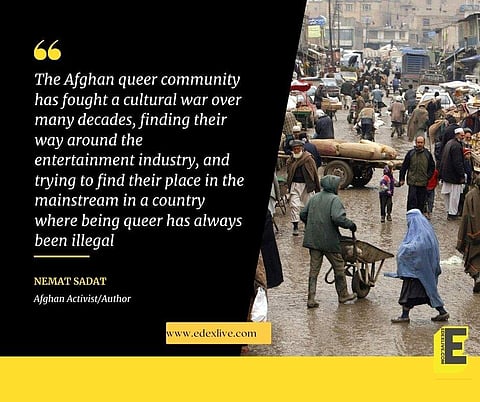

Nemat Sadat has a list. The Afghan activist/author is struggling to evacuate members of the LGBTQIA community from the now Taliban-controlled Afghanistan to safety. He, however, finds that the international community is hardly forthcoming with assistance and logistical support. “It is a form of racism,” says Nemat during an online discussion organised by Kolkata-based NGO, Prantakatha.
The author of the 2019 novel, The Carpet Weaver says that the international community is fast losing interest in the woes of his fallen country, almost terming them deserving of the barbarism they have been handed out by the Taliban. “Rachel Madow, from MSNBC, when I reached out to her to help amplify queer Afghan voices, said that Afghanistan has always been a graveyard of empires. That in itself was a defense for America’s failed 20-year war in the country, and a way to blame the victim for the current state of affairs, which, by the way, were escalated by the Americans,” Nemat says, "And NATO," he adds.
This was the narrative that the activist was attempting to change in the South Asian countries with the online discussion, connecting with people from the civil society and the media from India. He noted that India has one of the best foreign policies when it comes to Afghanistan, but that is probably undercut by the fact that their Citizenship Amendment Act (CAA) doesn’t allow them to take in any Afghan Muslims. Nemat said that if South Asian countries don’t raise their voices for the LGBTQIA community in Afghanistan, they will suffer from an inevitable extremist spill-over effect in their own countries.
Speaking at length about the extremely risky situation that queer Afghans currently find themselves in, Nemat says that out of the 1,100 listed cases of queer Afghans who want to leave the country since the Taliban took over last month, none of them have been awarded asylum because of their queer status. That observation is absurd in its own right because queer Afghans are at risk of the most brutal persecutions, given the fact that they are outlawed and singled out for the harshest of punishments even in the mildest interpretations of Islamic law. Under the Taliban’s strict Sharia version, they stand absolutely no chance. “The Taliban has a hitlist. Queer Afghans all across the country are just on the move, trying to remain hidden. It doesn’t help that orthodox Muslims would never cover for them, and therefore, avenues for safety are short strung anyway. One of the people on my list sent me a video recently, which he recorded from his hiding place in the ceiling of the house he was hiding in. The Taliban had come questioning and were whipping the people who had offered him sanctuary for not giving him up,” Nemat shares.
Nemat believes that the ISI is tracking and geopositioning via mobile networks to locate queer Afghans and others who are trying to escape the Taliban. “Pakistan remains the biggest enemy in the war that Afghanistan has been fighting over the last several decades. Any reform that the Afghan government wanted to introduce has always had to go through the scrutiny of Pakistan, and this has impeded progress in Afghanistan. And now they are enabling the Taliban to inflict tyranny,” said the activist, adding, “queer Afghans are hiding in basements, and on rooftops and in literal closets to stay alive in what is an impossible situation for them.”
The Afghan queer community has fought a cultural war over many decades, feels Nemat, finding their way around the entertainment industry, and trying to find their place in the mainstream in a country where being queer has always been illegal. However, he says that in a recent visit to Afghanistan, he saw that there was actual progress for the community, where once gay relationships and connections were restricted to one-night stands for the sake of safety, people were now living with their partners, and among people from the same community in relative safety.
With the fall of Afghanistan, Nemat has a dual role to fight. As an ex-Muslim who renounced his faith, he has struggled to communicate for rights and protection within his own community. And today, when people from across the spectrum in Afghanistan are being persecuted by a terrorist organisation, he is trying to get an international community to listen to these voices without a contemptuous bias that is quite evident in the global reaction to the crisis.
And the silence can be deafening.
